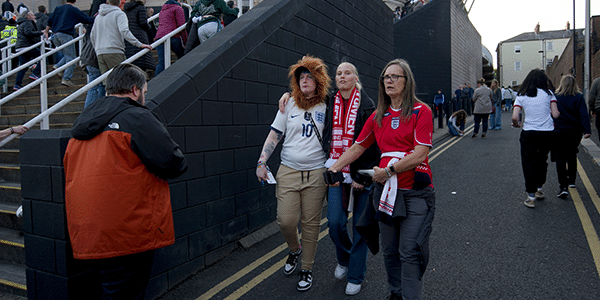
Photo by Paul Thompson/WSC Photos
From ensuring pitch access to dealing with social media hate, there is still a lot of work the FA need to do to boost participation for women and girls
By Flora Snelson
October 15, 2025
It’s tempting to look at the Lionesses’ Euro 2022 win and say it was the start of something. But England lifting their first major trophy at Wembley was rather the culmination of effort the FA put into developing the women’s game – albeit 50 years behind schedule. No, the FA haven’t been perfect, but they did build more and faster than their European counterparts in the decade preceding the home tournament, and they got the trophy to show for it.
The strapline for Euro 2025 ought then to have been “England Win: More Fast and More Furious” since, this time around, Europe’s souped-up competitors were breathing down the Lionesses’ necks. Spain cleaned out their closet in the summer of 2023, while “smaller” footballing nations like Portugal and Poland are throwing funds and ideas at the women’s game at a really positive rate.
This was a competitive field – only two of the tournament’s seven knockouts could be settled in 90 minutes. Drama and tension mingled with the unbeatable togetherness of national ambition to create a complete sporting experience, “women’s” or otherwise.
The good news is that so long as sport happens, its power to bring people together will endure. Less clear is whether the spirit of Euro 2025 will carry through to the domestic season, and how much of the appeal of the women’s game will be diminished by its ongoing professionalisation.
Today, fans love to watch because there is not so much of the theatrics by which Premier League players desperately grab for the fine-margins-high-stakes which come with the top level of men’s football. Fans of the women’s game love the fairytale stories of that dying breed of players who once used to pay their own subs and carpool to away matches. These aspects will disappear, as has the access you once had to your favourite players before Women’s Super League attendances more than tripled between 2021 and 2024.
That the gate receipts fell as Euro 2022 became a more distant memory tells us that entertainment must displace inspiration for sustained engagement to be achieved. The format tweaks introduced by WSL Football – the governing body for the top two tiers – will help, but courageous flexibility will be crucial to the prospect of a competition which is genuinely hard-fought. To keep attracting audiences, someone has to give six-in-a-row champions Chelsea a proper run for their money. The plethora of specialist podcasts and mainstream coverage now available simply did not exist when England lifted the trophy in 2022 and will have a big part to play in converting fans for the summer to longer-term devotees to the women’s game.
More than just a big win, the 2025 title was defined by the wealth of rich individual player narratives this squad brought to Switzerland. Jess Carter, defending England’s title just days after experiencing horrific racial abuse; Hannah Hampton, making title-winning saves years after doctors said that her eyes would never work well enough for her to be a professional athlete.
You wonder what will characterise tournament squads to come since, in many such cases, the grit that won the Lionesses the Euro 2025 trophy was born from the kind of adversity which will disappear, before long, as a direct legacy of these honours. Quarter-final hero Lucy Bronze knew how to strap her own broken leg, because that’s just what professionals used to do in the 2010s. Even Ella Toone, seven years Bronze’s junior, describes herself as “lucky” to have had a girls’ team near her as she was growing up. The FA are working hard to ensure that Toone’s situation is a given standard, today, and that England’s future trophy-lifters thrive because of their circumstances, not in spite of them.
Provision of football for women and girls is on the rise, generally – more than half a million new opportunities to play football have opened up in host cities since Euro 2022 – but the age-old problem of adolescent drop-outs has stuck.
In their 2020 Inspiring Positive Change strategy, the FA aimed to increase the number of secondary schools offering equal access to football in PE lessons from 44 per cent to 75 per cent. Instead, it rose to just 50 per cent, meaning that today half of the schools in this country still give teenage boys more opportunity to play football than girls, sending an influential message that is completely at odds with what Chloe Kelly keeps telling them in interviews on telly.
lBut this is about more than just the number of opportunities available. Canvassing big tech to finally act on the hate speech which fills social media platforms is a little beyond the traditional mandate of the FA, but reducing girls’ exposure to damaging rhetoric about female participation in sport is essential to keeping them there. What’s more, Michelle Agyemang’s turn as black poster girl at this summer’s tournament will have a significant impact on the participation of ethnic minorities in this country, but the FA risk losing so much talent if they don’t get a grip on persistent, ancient prejudices which continue to blight the game.
Much was made by the media of how central the Lionesses’ environment was to their performance – the team’s personal barista (and his lovely dog), the piano in Agyemang’s bedroom. At grassroots level, then, the absolute basics – sanitary waste disposal, showers with cubicles – must be met across the board or girls will continue to turn to activities where they can exist with confidence and without friction. Also to be filed under “basic respect”: facilities fulfilling all bookings made by women’s and girls teams, even when a men’s team fancy a pitch at the last minute.
At the heart of all of these tweaks – which are truly basic, when given due attention – are the people involved in the game. The FA should be throwing all it can at getting more female coaches in the game, and ensuring that each coach training course teaches awareness about these female-specific issues. The Lionesses have done the hard yards, but future exceptionalism at the top level depends on getting the details right.
This article first appeared in WSC 457, October 2025. Subscribers get free access to the complete WSC digital archive
Want to see your writing published in WSC? Take a look at our pitching guide and get in touch
Tags: Lionesses
